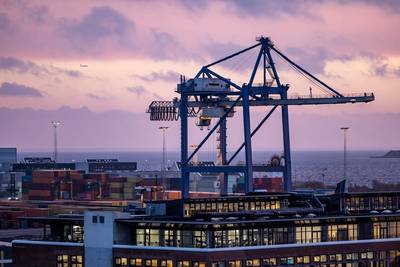Denmark Bans Discharge of Scrubber Water
The discharge of scrubber water from ships out to 22km (12 nautical miles) from the Danish coasts will be prohibited by law. The ban will come into effect on July 1, 2025, for ships with scrubbers in open operation, where the wash water is discharged into the sea. For ships with scrubbers in closed operation, the ban on water discharge will take effect on July 1, 2029.
The Ministry of Environment has stated that scrubber water has contributed to excessive levels of a number of heavy metals and tar substances such as lead, cadmium, anthracene and benz(a)pyrene in the marine environment. With the agreement, the discharge of nickel into the marine environment can be lowered by up to 20% and the discharge of anthracene by 7%.
"This agreement is another important step on the way to a better marine environment. Scrubber water emits a number of problematic substances which accumulate on our seabed and are absorbed into the ocean's food chains and end up in the fish we eat. The discharge of environmentally hazardous substances comes from many different sources, but scrubber water is a source about which we have a lot of knowledge and data, and therefore I am happy that we are now putting an end to the pollution with scrubber water in Danish territorial waters," says Environment Minister Magnus Heunicke.
Denmark is also calling for a similar ban in the Baltic Sea and North Sea through the regional maritime conventions HELCOM and OSPAR with a view to regulation under the auspices of the IMO.
With the agreement, ships must in future switch to using either low-sulphur fuel or closed scrubbers with zero emissions. This means that the residual product from the closed scrubber must be delivered to the ports' reception facilities.
The International Council on Clean Transportation estimated in 2020 that 68 million tons of scrubber water containing heavy metals and tar substances was discharged within 22km of the coast in Denmark. This makes Denmark the country in the world where the sixth largest amount is discharged.
A new analysis from NIVA Danmark on the total human pressure on Danish marine areas found that environmentally hazardous substances are the third biggest pressure factor for the marine environment.
Ireland, Germany, Norway, Spain and Portugal have introduced a ban on discharging scrubber water into harbours, fjords and/or inland waterways, while France and Belgium have a ban out to three nautical miles, and Latvia has a ban out to 12 nautical miles.
"I am pleased that the politicians have chosen to listen to our request to introduce a sensible phase-in period, so that the shipping companies that have invested a lot of money in complying with the rules and reducing their sulfur emissions with a scrubber, have time to adapt to a new reality," said Nina Porst, Director of Climate, Environment, and Safety at Danish Shipping.
“We will, of course, comply with the new rules, and therefore it is also important for us that the ban comes with a plan that will ensure robust enforcement.”












